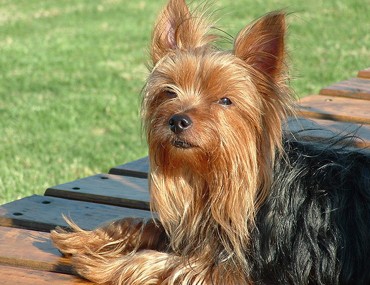Background
They’re considered “toys” now, but for working men in nineteenth-century Yorkshire, England, the Yorkshire Terrier was a tireless ratter in mine shafts and textile mills. They were also bold little dogs, able to break into badger and fox burrows and flush out game for hunters.
Known affectionately as “Yorkies,” these dogs were likely created when Scotsmen, seeking work in Yorkshire, brought breeds such as the Skye Terrier and the Manchester Terrier (and possibly Maltese) with them. These breeds were crossed with local breeds, like the Leeds Terrier, and the result was a larger version of what is now the modern-day Yorkie.
The Yorkie made it to North America in the late nineteenth century, and today it is the third most popular dog breed in the U.S., according to the AKC.

Sizing up (or down)
The Yorkie is tiny! Part of the toy dog group, Yorkies share some common physical traits:
- Height: 6-7 in.
- Weight: 3-7 lbs.
- Lifespan: 13-16 years
- Coat: glossy, fine, straight, and silky
- Color: black with tan points as a puppy; gray-blue, tan, or a combination as an adult
What are they like?
Eager for adventure and unaware of their small size, the long-haired, silky Yorkie is energetic and brave. Yorkies are smart and independent, which makes them both fun and stubborn. While they are very trainable and respond well to positive attention (and treats!), they can also lose interest quickly and have a mischievous streak.
Yorkies will try to take on any sized dog (or cat), but they can also be very laidback and cuddly. They’re a lot of fun to live with and can provide hours of entertainment. Yorkies tend to do well in smaller spaces, so they are suitable for apartments. Also, their tiny size makes them highly portable and great travel companions.
There are a few health concerns that you should know about if you’re interested in welcoming a Yorkie into your family:
- Allergies
- Early tooth decay
- Kidney stones
- Portosystemic shunt
- Luxating patella, a condition in which the kneecap pops out of place
- Tracheal collapse (collapsed windpipe)
- Joint problems, such as Legg-Perthes disease
Right for you?
Yorkies can be great dogs for the right person or family, but there are always things to consider when thinking about welcoming a new dog into your home.
- Yorkies aren’t great around small children, but that’s only because small children who haven’t learned to be gentle with animals can more easily hurt the tiny Yorkie.
- Bigger company can mean big problems. Yorkies aren’t great around bigger dogs because they are both territorial and not very tolerant of other dogs. This can lead to tussles and, when going up against bigger dogs, injuries.
- Oops! Yorkies can be more difficult to housetrain than other breeds (part of this is because they don’t like cool weather and tend to thrive in warmer climates). You’ll need to be patient and provide a lot of positive reinforcement.
- Grooming: although Yorkies don’t shed a lot, they have very long coats that need to be brushed daily. You’ll need to stay on top of grooming to keep your dog comfortable and avoid tangles!
If you have any questions or concerns, you should always visit or call your veterinarian – they are your best resource to ensure the health and well-being of your pets.
